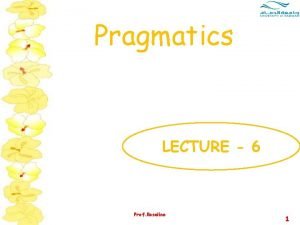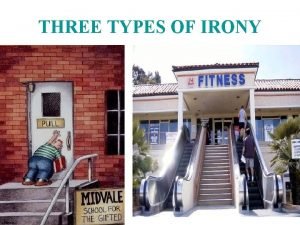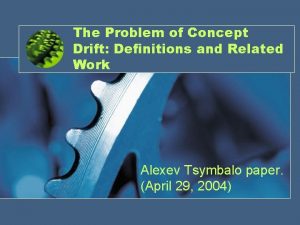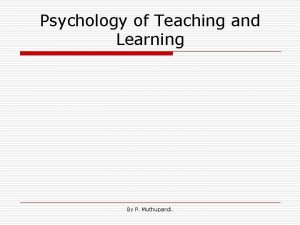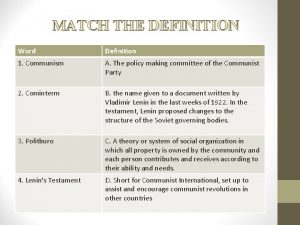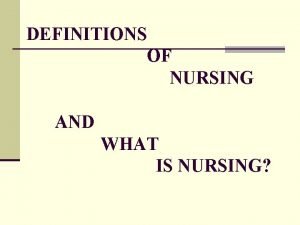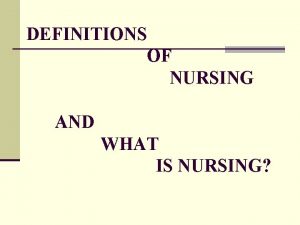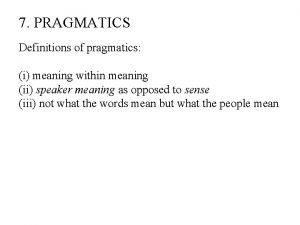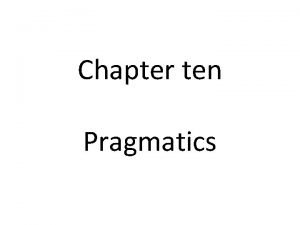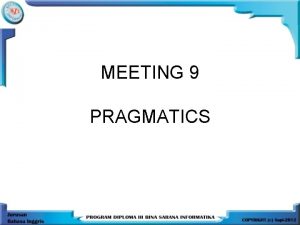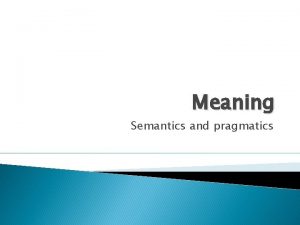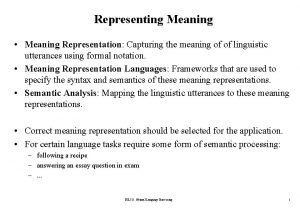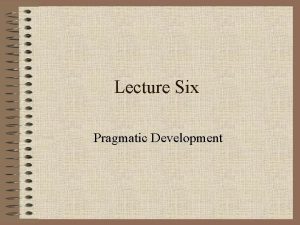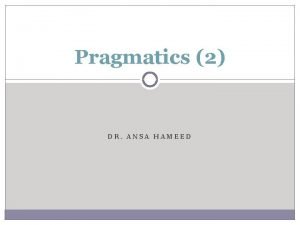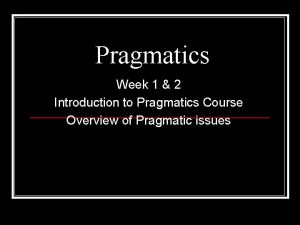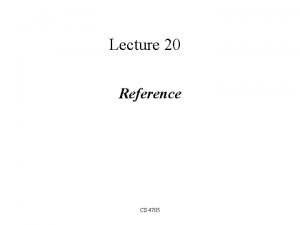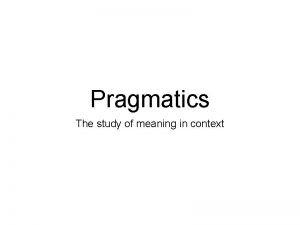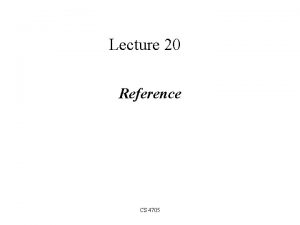7 PRAGMATICS Definitions of pragmatics i meaning within

















![LADY BRACKNELL: […] Do you smoke? JACK: Well, yes, I must admit I smoke. LADY BRACKNELL: […] Do you smoke? JACK: Well, yes, I must admit I smoke.](https://slidetodoc.com/presentation_image_h/7ca420e83dbeba3459b46be042cc028a/image-18.jpg)
![LADY BRACKNELL: […] I have always been of the opinion that a man who LADY BRACKNELL: […] I have always been of the opinion that a man who](https://slidetodoc.com/presentation_image_h/7ca420e83dbeba3459b46be042cc028a/image-19.jpg)
![LADY BRACKNELL: […] Now to minor matters. Are your parents living? JACK: I have LADY BRACKNELL: […] Now to minor matters. Are your parents living? JACK: I have](https://slidetodoc.com/presentation_image_h/7ca420e83dbeba3459b46be042cc028a/image-20.jpg)







- Slides: 27

7. PRAGMATICS Definitions of pragmatics: (i) meaning within meaning (ii) speaker meaning as opposed to sense (iii) not what the words mean but what the people mean

Paul Grice’s Cooperative Principle (1975) 1. Do not say too little or two much (quantity maxim) 2. Tell the truth or what you think is the truth (quality maxim) 3. Only say what is relevant (relation maxim) 4. Be clear, brief and orderly (manner maxim) But sometimes we flout or violate a maxim. This creates an implicature, i. e. the speaker communicates something without saying it explicitly.

1. Do not say too little or two much (quantity maxim) 2. Tell the truth or what you think is the truth (quality maxim) 3. Only say what is relevant (relation maxim) 4. Be clear, brief and orderly (manner maxim) Which maxim is flouted and what is the implicature? MOTHER: Where are you going? DAUGHTER: Out.

1. Do not say too little or two much (quantity maxim) 2. Tell the truth or what you think is the truth (quality maxim) 3. Only say what is relevant (relation maxim) 4. Be clear, brief and orderly (manner maxim) Which maxim is flouted and what is the implicature? A: It’s really heavy. Do you think you can lift it? B: Do you think fish can swim?

1. Do not say too little or two much (quantity maxim) 2. Tell the truth or what you think is the truth (quality maxim) 3. Only say what is relevant (relation maxim) 4. Be clear, brief and orderly (manner maxim) Which maxim is flouted and what is the implicature? A. Are you hungry? B. I could eat a horse.

Formally similar words in the source and target languages may serve different pragmatic purposes. Example: in fact and infatti I only had a light lunch. In fact, I just had a couple of biscuits. In English, in fact is used to correct or reformulate a previous utterance. Ho pranzato in modo leggero. Anzi ho mangiato un paio di biscotti. A: Sarà un lavoraccio. B: Sì, infatti. In Italian infatti often expresses agreement. A: It’s going to be a tough job. B: Yeah, you’re right.

Knowledge of the world “For meaningful communication to take place, and this includes the act of translation, the participants in the communication act must inhabit the same universe of discourse. ” (Taylor, p. 93) The Sapir-Whorf hypothesis implies that a perfect translation is impossible: “[…] no two languages are ever sufficiently similar to be considered as representing the same reality. The worlds in which different societies live are distinct worlds, not merely the same world with different labels. ” (Edward Sapir, 1929: 214) Today most people consider Sapir and Whorf’s anthropological approach excessively pessimistic as regards translation. However, Taylor (p. 95) points out that in two relatively similar societies – Britain and Italy – we may have difficulties even with basic expressions like Good evening and Buona sera, which do not refer to the same time spans.

Speech Act Theory (John Austin 1962, John Searle 1969) A Speech Act consists of three components: 1. The locutionary act (making an utterance of any kind) 2. The illocutionary act/force (the speaker’s communicative intention) 3. The perlocutionary effect (the effect on the listener)

An Authentic Speech Act and a Commentary STUDENTESSA: Professore, non è che può spostare la data dell’appello? Ho l’esame con il prof. XXXX nello stesso giorno. DOCENTE: Quanti studenti deve interrogare il prof. XXXX? STUDENTESSA: Sì, ma è difficile. DOCENTE: È facile invece. Basta dire, “Professore, non è che può spostare la data dell’appello? ” The student’s illocutionary force is a request, although she expresses it indirectly by using an interrogative construction. The perlocutionary effect on the teacher is one of mild irritation. His reply is a flout of the relation maxim because instead of answering her question he asks a question himself. But his illocutionary force is not really to ask for information. He already knows that, unlike himself, Prof. XXXX has very few students to examine, so it would be much easier for the latter to move his exam. His real message to the student is, “Why don’t you try asking Prof. XXXX to be a bit flexible? ” The student understands the implicature. The perlocutionary effect on her is disappointment. She knows that she cannot expect any favours from Prof. XXXX. The illocutionary force of her next utterance is an indirect way of saying that Prof. XXXX is a difficult person to approach. The teacher understands her perfectly but pretends to have misunderstood the referent of the word difficile. His illocutionary force is to again refuse her request but also to introduce an element of irony to reduce the tension.

The interpersonal element “Questions of register come into play depending on the status, personality, age, sex, and education level of the participants in a discourse. ” Taylor, p. 100 Translating from English to Italian you also have to consider: 1. whether you should be translated as tu, Lei, voi or Loro; 2. the appropriate syntactic form for a given situation (Please pass me the salt. Can you pass me the salt? Could you pass me the salt? Would you be so kind as to pass me the salt? ); 3. the degree of formality of certain lexical items (Sally is a really chatty/talkative/loquacious person).

The interpersonal element: getting it wrong Authentic example 1 As a couple were leaving a Chinese restaurant, the waiter said, “Ciao, signori. ” Authentic example 2 In British English the expression “it’s not my cup of tea” means “non è di mio gusto” or “non è il mio genere (di film, tipo di vacanza ecc. )”.

A mother from Manchester who took her five children to Syria has said she wants to return to Britain after finding Isis supporters were “not my cup of tea”. (The Times 18. 10. 2015) Shukee Begum, 33, says she went in an attempt to convince her husband Jamal al-Harith, a former Guantanamo Bay detainee who had joined the terror group, to return with her. He refused and she was told she could not leave the camp. She and her children managed to escape and they are now living under the protection of an anti-Isis group somewhere in Syria.

Cultural constraints “Translators find themselves in the position of having to straddle two cultures, and in order to successfully make the linguistic jump from one to the other, they should have a thorough knowledge of the potential of both systems to express experience, entities or events. The translator should therefore ideally be bilingual and bicultural. ” Taylor, p. 103 You have to know about Italian culture to know that you shouldn’t order a cappuccino after lunch, you shouldn’t wear socks with sandals, polenta (not translated) is a kind of food but un polentone is an offensive term for someone from the north of Italy, terra means land but un terrone is an offensive term for a southern Italian. You have to know about British culture to understand that eating horse meat is unthinkable, black cats bring good luck, that toad-in-the hole and spotted dick are good to eat, and that fags are cigarettes (while in the USA fags are homosexuals).

Are colours universal? For Europeans the sun is yellow; for the Japanese it is red. For English speakers the yolk of an egg is yellow; for Italians it is il rosso dell’uovo. The British and the Sardinians have very different ideas of black hair and blond hair. Colours can have very different connotations in different cultures.

How can translators deal with untranslatable culture-bound language? Taylor (p. 105) suggests three possible approaches: PARAPHRASE ANNOTATED EXPLANATIONS DELETION See Taylor’s three translations of “The boys were out playing conkers”.

From The Importance of Being Earnest by Oscar Wilde (1895) Mr Worthing uses the name Earnest when he is in London but Jack when he is in the country. At the moment he is Jack. FIELD: Jack has just proposed marriage to Gwendolen and she has accepted. But Gwendolen’s mother, Lady Bracknell, intervenes to say that she will decide who her daughter marries and when. She wants to ask Jack a few questions. TENOR: All the characters in the play are aristocrats who have no need to work and who believe that they are innately superior to those who do have to work. Like all aristocrats, they have a strong sense of hierarchy and a strong desire to conform – at least superficially – to the norms of their society. MODE: Their spoken English is formal, grammatically perfect and lexically rich, so it has characteristics normally associated with written language.

GWENDOLEN: I am engaged to Mr Worthing, mamma. LADY BRACKNELL: Pardon me, you are not engaged to anyone. When you do become engaged to someone, I, or your father, should his health permit him, will inform you of the fact. An engagement should come on a girl as a surprise, pleasant or unpleasant, as the case may be. It is hardly a matter that she could be allowed to arrange for herself. And now I have a few questions to put to you, Mr Worthing. While I am making these enquiries, you, Gwendolen, will wait for me below in the carriage. GWENDOLEN: Mamma! LADY BRACKNELL: In the carriage, Gwendolen!
![LADY BRACKNELL Do you smoke JACK Well yes I must admit I smoke LADY BRACKNELL: […] Do you smoke? JACK: Well, yes, I must admit I smoke.](https://slidetodoc.com/presentation_image_h/7ca420e83dbeba3459b46be042cc028a/image-18.jpg)
LADY BRACKNELL: […] Do you smoke? JACK: Well, yes, I must admit I smoke. LADY BRACKNELL: I am glad to hear it. A man should always have an occupation of some kind. There are far to many idle men in London as it is.
![LADY BRACKNELL I have always been of the opinion that a man who LADY BRACKNELL: […] I have always been of the opinion that a man who](https://slidetodoc.com/presentation_image_h/7ca420e83dbeba3459b46be042cc028a/image-19.jpg)
LADY BRACKNELL: […] I have always been of the opinion that a man who wishes to get married should either know everything or nothing. Which do you know? JACK (after some hesitation): I know nothing, Lady Bracknell. LADY BRACKNELL: I am pleased to hear it. I do not approve of anything that tampers with natural ignorance. Ignorance is like a delicate exotic fruit; touch it and the bloom is gone. The whole theory of modern education is radically unsound. Fortunately in England, at any rate, education produces no effect whatsoever. If it did, it would prove a serious danger to the upper classes and probably lead to acts of violence in Grosvenor Square. What is your income?
![LADY BRACKNELL Now to minor matters Are your parents living JACK I have LADY BRACKNELL: […] Now to minor matters. Are your parents living? JACK: I have](https://slidetodoc.com/presentation_image_h/7ca420e83dbeba3459b46be042cc028a/image-20.jpg)
LADY BRACKNELL: […] Now to minor matters. Are your parents living? JACK: I have lost both my parents. LADY BRACKNELL: Both? To lose one parent may be regarded as a misfortune… to lose both seems like carelessness. Who was your father? He was evidently a man of some wealth. Was he born in what the Radical papers call the purple of commerce, or did he rise from the ranks of the aristocracy? Problems with the verbs lose, mislay, miss, perdere and smarrire. I realized that I had lost/mislaid my house keys = Mi sono accorto che avevo perso/smarrito le chiavi di casa. Ho perso il treno = I missed the train. I lost my mother when I was only 12 = Ho perso la mamma quando avevo 12 anni.

JACK: I am afraid I really don’t know. The fact is, Lady Bracknell, I said I had lost my parents. It would be nearer the truth to say that my parents seem to have lost me… I don’t actually know who I am by birth. I was… well, I was found. LADY BRACKNELL: Found! JACK: The late Mr Thomas Cardew, an old gentlemen of a very charitable and kindly disposition, found me, and gave me the name of Worthing, because he happened to have a first-class ticket for Worthing in his pocket at the time. Worthing is a place in Sussex. It is a seaside resort. LADY BRACKNELL: Where did the charitable gentlemen who had a first-class ticket for this seaside resort find you?

JACK: In a hand-bag. LADY BRACKNELL: A hand-bag! JACK: Yes, Lady Bracknell. I was in a hand-bag… a somewhat large, black leather hand-bag, with handles to it… an ordinary hand-bag in fact. LADY BRACKNELL: In what locality did this Mr James, or Thomas, Cardew come across this ordinary hand-bag? JACK: In the cloak-room at Victoria Station. It was given to him in mistake for his own. LADY BRACKNELL: The cloak-room at Victoria Station? JACK: Yes, The Brighton line.

LADY BRACKNELL: The line is immaterial. Mr Worthing, I confess I feel somewhat bewilderd by what you have just told me. To be born, or at any rate bred, in a hand-bag, whether it had handles or not, seems to me to display a contempt for the ordinary decencies of family life that reminds one of the worst excesses of the French Revolution. And I presume you know what that unfortunate movement led to? As for the particular locality in which the hand-bag was found, a cloak-room at a railway station might serve to conceal a social indiscretion… has probably, indeed, been used for that pupose before now… but it could hardly be regarded as an assured basis for a recognized position in good society. JACK: May I ask you then what you would advise me to do? I need hardly say that I would do anything in the world to ensure Gwendolen’s happiness?

LADY BRACKNELL: I would strongly advise you, Mr Worthing, to try and acquire some relations as soon as possible, and to make a definite effort to produce at any rate one parent of either sex, before the season is over. JACK: Well, I don’t see how I could possibly manage to do that. I can produce the hand-bag at any moment. It is in my dressing-room at home. I really think that should satisfy you, Lady Bracknell. LADY BRACKNELL: Me, sir! What has it to do with me? You can hardly imagine that I and Lord Bracknell would dream of allowing our only daughter – a girl brought up with the utmost care – to marry into a cloakroom, and form an alliance with a parcel? Good morning, Mr Worthing. LADY BRACKNELL sweeps out in majestic indignation.

You can see the film version in Italian on You. Tube: https: //www. youtube. com/watch? v=VNT 2 z 0 j. HS 3 Y

FALSE FRIENDS 7 Trivial: 1. Insignificante, di poco conto 2. Banale, di tutti giorni 3. Superficiale Triviale: coarse, vulgar Oscar Wilde described The Importance of Being Earnest as a trivial comedy for serious people. Casual: informale. A typical collocation is “casual clothes”. The word is also used in a negative sense in an expression like “a casual attitude” (un atteggiamento distratto/noncurante). Casuale: chance (un chance encounter – un incontro casuale); coincidental (any resemblance between characters in this book and living persons is purely coincidental) catholic (with lower case c): non esclusivo, svariato. He has catholic tastes in music: classical, jazz, hip hop, everything.

THE DIARY OF A BRAVE TRANSLATOR VERILY IN LEG – PART 7 When my boss wanted us to work on Saturday mornings I told him popely that the proposal was totally unacceptable. He was encabbaged and I know he’s a vindictive sort of person, so between to see and not to see I had a chat with our union representative.
 Invisible meaning in pragmatics
Invisible meaning in pragmatics Invisible meaning in pragmatics
Invisible meaning in pragmatics Within run and across run meaning
Within run and across run meaning Definition of nursing who
Definition of nursing who What are the three types of irony
What are the three types of irony The problem of concept drift: definitions and related work
The problem of concept drift: definitions and related work Safety terms and definitions
Safety terms and definitions Cheek cut rafter
Cheek cut rafter Types of range of motion
Types of range of motion Speech to actuate definition
Speech to actuate definition Meaning of educational psychology
Meaning of educational psychology Oags dashboard
Oags dashboard Defining poverty
Defining poverty Www youtube com
Www youtube com Comparison between microteaching and traditional teaching
Comparison between microteaching and traditional teaching Revision materials
Revision materials Kulaks definition
Kulaks definition Leadership management definition
Leadership management definition Defining human rights
Defining human rights Definiton of plot
Definiton of plot Plot diagram definition
Plot diagram definition Vocabulary words for hatchet
Vocabulary words for hatchet Parts of a circle definition
Parts of a circle definition Gothic fiction meaning
Gothic fiction meaning 8 values of news
8 values of news Basic nursing definition
Basic nursing definition Nursing definition by florence nightingale
Nursing definition by florence nightingale Examples of definition paragraph
Examples of definition paragraph
